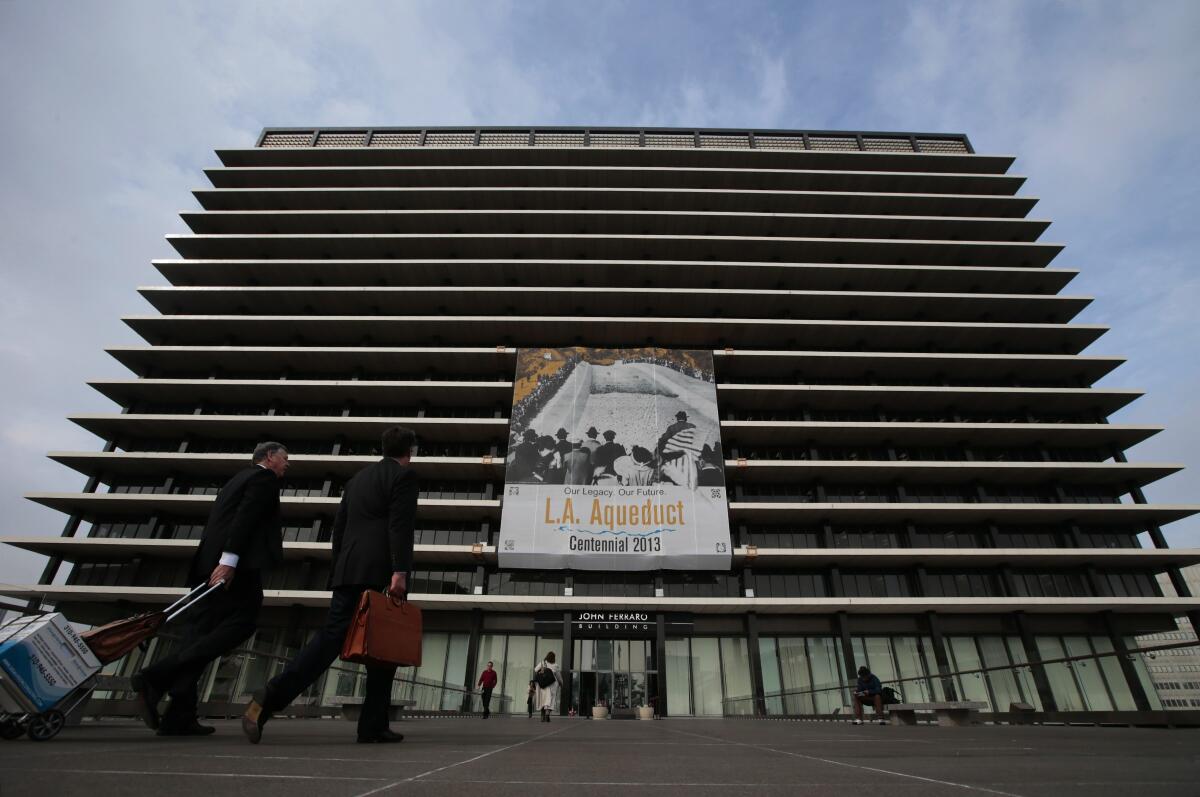Overtime costs soared at DWP’s security unit amid lax oversight, watchdog report finds

Supervisors at the Los Angeles Department of Water and Power’s security division bolstered their paychecks by working regular hours at overtime rates, according to a report from the utility’s Office of Inspector General.
The report, which studied overtime payout at the Security Services Division over a five-year period, found both a lack of oversight and a lack of set policies.
“Written policies regarding overtime [at the security division] are largely nonexistent,” the report noted. It also said that “individuals self-reported overtime work without any apparent effort by respective managers to assess whether the time was actually worked or whether the use of overtime was appropriate.”
Overtime expenditures at the division were 66% of regular labor compensation, while overtime for the utility as a whole was 26% of compensation from 2017 to 2022, according to the report.
Former DWP Inspector General Sergio Perez told The Times that the absence of policies around overtime “may have led to potentially unjustified expenditures of millions of dollars.”
The study “revealed systemic issues and failures by the department to effectively manage overtime in the public’s best interest,” said Perez, who worked on the report but left the DWP in December to join the Los Angeles city controller’s office.
Chris Vicino, who heads the security services division, contested some of the report’s conclusions, telling the DWP commissioners at Tuesday’s board meeting that there is some “documentation.”
At the same time, Vicino said he accepts responsibility for “fixing” the overtime usage. The majority of overtime is used to backfill positions when an employee is out because of vacation, illness or other reason, Vicino told The Times.
The inspector general’s report was highly anticipated, the first investigation from an office announced in the wake of the 2019 FBI raid of the utility and City Hall. The raid resulted in a string of guilty pleas, including from the former DWP’s general manager.
The use of overtime at the security division was “consistently higher than that of the LADWP as a whole,” the report found. On average, the division spent $13.72 million annually in overtime over the five-year period, according to the report.
In the new L.A. DWP contract, aimed at keeping and attracting workers, the pay is good and healthcare is free.
Security division “employees, on average, are making nearly three times more in overtime pay compared to all LADWP employees,” the report found.
The security services division has about 250 employees, including 28 supervisors, who are responsible for ensuring the safety of department staff, facilities and visitors.
The report found that uniformed security and their supervisors within the division “were the primary drivers of overtime costs during the review period.”
The report highlighted how employees can earn double pay for regular hours: A “uniformed supervisor who is asked to work more than one hour immediately before a scheduled shift is then due 2X pay for that time and the regular shift that follows.”
Investigators studied unscheduled overtime hours and scheduled regular shift hours that were paid at overtime rates. “The data revealed that, on average, nearly 30% of hours paid at 2X were actually regular shift hours — not true overtime,” the report found.
Starting in 2020, the use of overtime at the security services division declined after the city shifted to using contract services, according to the report.
The high use of overtime at the security division has been on the utility’s radar for years. At a DWP commission hearing last year on the issue, Vicino blamed the utility’s slow hiring process.
Vicino faced tough questions from DWP Commission President Cynthia McClain-Hill at that 2022 hearing. At one point, Vicino said the security division provided escorts for DWP employees during the 2020 protests in L.A. over the murder of George Floyd. The employees, who were doing water work, didn’t feel safe, Vicino said.
Get the lowdown on L.A. politics
Sign up for our L.A. City Hall newsletter to get weekly insights, scoops and analysis.
You may occasionally receive promotional content from the Los Angeles Times.
“We provided those escorts for several months,” Vicino said.
“The civil disobedience didn’t go on for months, it went on for days,” McClain-Hill told him.
At Tuesday’s meeting, DWP General Manager Marty Adams suggested the overtime problem wasn’t limited to the security services division. The utility has not had “an overarching effective overtime policy” for years, if not decades, said Adams, adding that he planned to bring an overtime policy to the board by the end of the month.
That plan didn’t satisfy McClain-Hill.
“I’m looking for, first and foremost, an acknowledgment of failure,” McClain-Hill told Adams. “And not some slapdash, quick response about what we’re going to do now, but a very comprehensive review.”
Overtime rates for security staff are set by collective bargaining agreements. However, those bargaining agreements do not establish criteria for when or how the overtime should be used, the report noted.
Unions that represent DWP workers include Service Employees International Union 721 and International Brotherhood of Electrical Workers Local 18. A representative for IBEW 18 declined to comment. SEIU 721 didn’t immediately respond.
The city’s latest labor agreement with IBEW 18, approved last year by then-Mayor Eric Garcetti and the DWP board of commissioners, continues to allow workers to earn a double-time rate for normal hours. Under the agreement, some employees can work four hours of overtime and then their regular shift and be paid double-time for all the work.
Adams, the general manager, told the Times that the four-hour threshold replaced the one-hour threshold in the previous IBEW contract.
More to Read
Sign up for Essential California
The most important California stories and recommendations in your inbox every morning.
You may occasionally receive promotional content from the Los Angeles Times.












